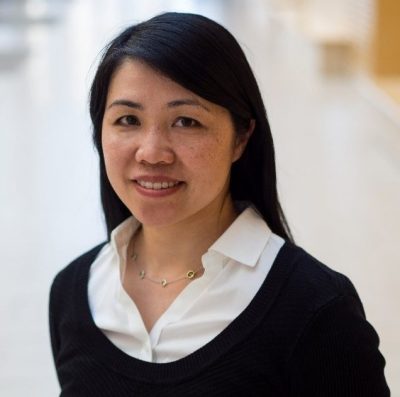
Research Interests
Biomedical engineering, Biosensors, Implantable neural interfaces, Inkjet printing, Organs-on-chip, Tissue engineering
Research Focus Teams
COVID-19, Cancer, Aging, Lung Disease
Departments
School of Biomedical Engineering, Electrical & Computer Engineering
Contact
Email: kcheung[at]ece.ubc.ca
Office Phone: 604–822–1787
Office number: 4305
Publications
Lab Website
Karen C. Cheung received the B.S. and Ph.D. degrees in Bioengineering from the University of California, Berkeley, USA. She was a Postdoctoral Researcher at the École Polytechnique Fédérale de Lausanne in Switzerland. She is now a Professor in the School of Biomedical Engineering and the Department of Electrical & Computer Engineering at the University of British Columbia, Vancouver, Canada.
Awards
Elected to the AIMBE College of Fellows, 2021. https://aimbe.org/2021-aimbe-fellows/
Inkjet Dispensing of Cells for Additive Manufacturing and Single-Cell Assays: We use piezoelectric drop-on-demand inkjet to dispense living mammalian cells onto tissue culture scaffolds or substrates for additive manufacturing and cell-based assays.
Engineered Tissues for High Content Screening: This research will help us create new models for drug screening and could reduce the need for animal testing. Small tissue constructs comprising several cell types within a three-dimensional environment can better mimic tissue, and may provide a better system to screen and validate drugs than current two-dimensional monolayer cultures.
Silicon Photonic Biosensors: Our research in silicon photonic biosensors has application for pathogen detection.
Technologies & Methods
Implantable neural interfaces, Organs-on-chip, Tissue Engineering
Bio-Medical Micro Devices (BioMEMS) research at UBC works to miniaturize systems or devices, such as implants or lab instruments. BioMEMS research has a profound impact on the future of medicine. Our research focuses on areas including implantable microelectrodes, chemical sensors, and microfluidic devices.
In our Implantable microelectrodes research we are attempting to increase biocompatibility of implants used for extended periods of time in patients. Our Chemical sensor research combines nanotechnology and microtechnology to use polymer nanofibres for more accurate testing. In our lab we are also using microfluidic devices to test tumor cells using three-dimensional cell cultures.
Students in the BioMEMs lab work on a multitude of inter-disciplinary levels richly integrating biology and engineering to include material science, chemistry and cell biology.